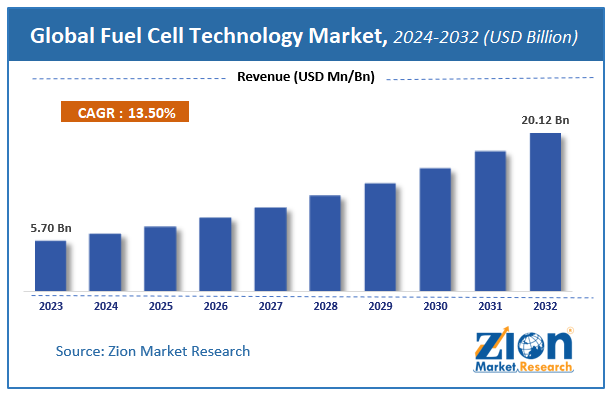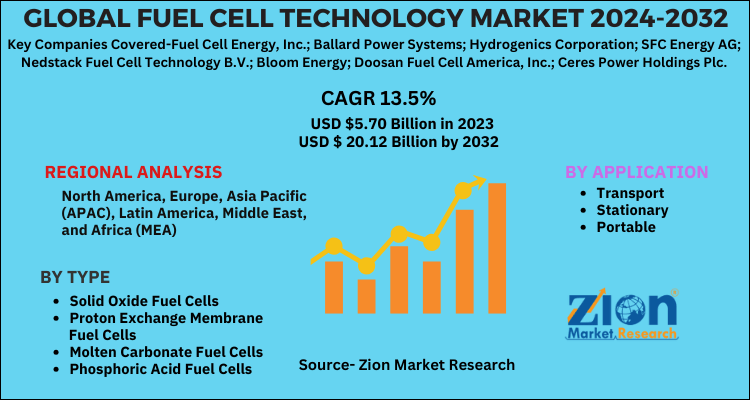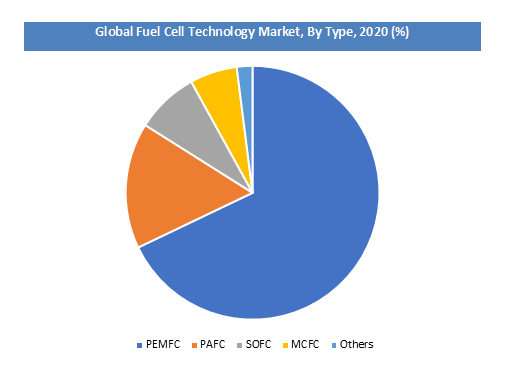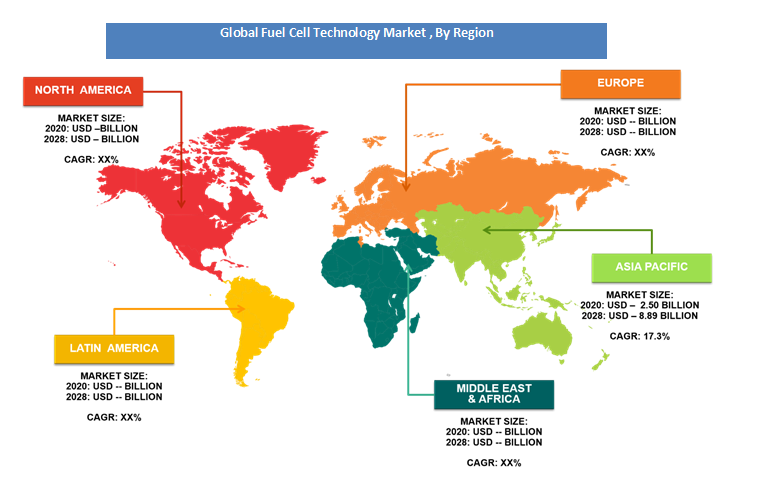Global Fuel Cell Technology Market Trend, Share, Growth, Size, Analysis and Forecast 2032

Global Fuel Cell Technology Market by Type (Solid Oxide Fuel Cells, Proton Exchange Membrane Fuel Cell, Molten Carbonate Fuel Cell, Phosphoric Acid Fuel Cells, and Others), By Application (Transport, Stationary, Portable): Global Industry Perspective, Comprehensive Analysis, and Forecast, 2024 - 2032
| Market Size in 2023 | Market Forecast in 2032 | CAGR (in %) | Base Year |
|---|---|---|---|
| USD 5.70 Billion | USD 20.12 Billion | 13.5% | 2023 |
Global Fuel Cell Technology Market Insights
Zion Market Research has published a report on the global Global Fuel Cell Technology Market, estimating its value at USD 5.70 Billion in 2023, with projections indicating that it will reach USD 20.12 Billion by 2032. The market is expected to expand at a compound annual growth rate (CAGR) of 13.5% over the forecast period 2024-2032. The report explores the factors fueling market growth, the hitches that could hamper this expansion, and the opportunities that may arise in the Global Fuel Cell Technology Market industry. Additionally, it offers a detailed analysis of how these elements will affect market demand dynamics and market performance throughout the forecast period.
A fuel cell is a system that effectively conducts and generates electricity by combining a cathode and an anode immersed in an electrolyte medium.
Chemical energy is converted into electrical energy by fuel cells. Buildings use fuel cells as a source of heat and energy, as well as as an electrical power source for electric motors that drive cars. Forklifts, or trucks that carry and move bulky goods, are often often used. Fuel cells don't need to be charged externally and can generate electricity as long as they have access to fuel and oxygen.
Growth Factors
One of the major growth drivers for the Global Fuel Cell Technology Market is increasing Demand for electric vehicles, hybrid electric vehicles, and plug-in hybrid vehicles (EV/HEV/PHV). The market for electric cars is rapidly increasing, resulting in a strong demand for fuel cells. Furthermore, the carbon emissions have heightened government interest in the use of electric and plug-in hybrid cars.
Another factor for the growth in this market is the dependency on oil, diesel, and other non-conventional energy source is reducing. The demand for fuel cells has increased around the world. Excessive CO2, CO, NOx, and SOx emissions from traditional petroleum products and oils have raised environmental issues. By - reliance on gasoline, diesel, and other fossil fuels, fuel cells act as an alternative to traditional and unconventional energy sources.
Because of the growing need for environmentally sustainable cars, fuel cells have a strong acceptance rate in the transportation sector. Furthermore, as the government's commitment to reducing greenhouse emissions grows, the need for fuel cell vehicles, buses, and trucks grows. The demand for stationary fuel cells in buildings, schools, and shopping centres has increased as a result of globalisation. Fuel cells are expected to become more widely used in handheld devices such as smartphones, tablets, and PCs, as well as as power backup batteries, and have been described as a profitable target market for investment.
Global Fuel Cell Technology Market: Report Scope
| Report Attributes | Report Details |
|---|---|
| Report Name | Global Fuel Cell Technology Market |
| Market Size in 2023 | USD 5.70 Billion |
| Market Forecast in 2032 | USD 20.12 Billion |
| Growth Rate | CAGR of 13.5% |
| Number of Pages | 140 |
| Key Companies Covered | Fuel Cell Energy, Inc.; Ballard Power Systems; Hydrogenics Corporation; SFC Energy AG; Nedstack Fuel Cell Technology B.V.; Bloom Energy; Doosan Fuel Cell America, Inc.; Ceres Power Holdings Plc; Plug Power, Inc.; Nuvera Fuel Cells LLC.; and Others |
| Segments Covered | By Type, By Application and By Region |
| Regions Covered | North America, Europe, Asia Pacific (APAC), Latin America, Middle East, and Africa (MEA) |
| Base Year | 2023 |
| Historical Year | 2018 to 2022 |
| Forecast Year | 2024 - 2032 |
| Customization Scope | Avail customized purchase options to meet your exact research needs. Request For Customization |
Type Segment Analysis Preview
In 2019, the Proton Exchange Membrane Fuel Cell (PEMFC) accounted for more than 67.7% of all units shipped. Forklifts, motorcycles, telecommunications, main systems, and secondary control systems are all examples of PEMFC implementations. Their demand is expected to be bolstered by their versatility in the forecast timeframe.
Fuel Cell Technologies Office (FCTO), Solid Oxide Fuel Cell (SOFC), and other fuel cell research projects receive funds from the US Department of Energy (DOE). The Solid Oxide Fuel Cell (SOFC) is expected to expand rapidly in the immediate future. In SOFCs, the presence of all solid components eliminates the need for electrolyte loss. The fact that they can work at high temperatures reduces the need for expensive catalysts like ruthenium.
Molten Carbonate Fuel Cells (MCFC) emerged as the most common product category in 2019, with 380 MW of demand. The market for molten carbonate fuel cells is expected to rise steadily in the coming years, thanks to their widespread use in large stationary power plants.
Application Segment Analysis Preview
In terms of application, stationary fuel cells lead the Fuel Cell Market. The stationary segment is expected to retain its leadership role due to product simplicity and performance. Due to the demand for fuel cell powered forklifts and increased R&D activities in developing economies of Europe, the transportation sector is projected to be the fastest growing segment during the forecast period. Personal devices, portable products, printers, mobile phones, APUs, and household products, among other things, use portable fuel cells.
Regional Segment Analysis Preview
The Global Fuel Cell Technology Market is divided into five regions : North America, Europe, Asia Pacific, Latin America and Middle East Africa . The Asia Pacific is currently the largest market for fuel cells and a key region in the advances in fuel cell technology market, followed by North America and Europe.
In 2020, Asia-Pacific accounted for a large share with 17.3 % CAGR and this domination is projected to persist during the forecast period. Because of supportive government policies in countries like China, Japan, and South Korea, the Asia-Pacific region is one of the most lucrative international markets for fuel cells in the coming years. The PEMFC is the most widely deployed fuel cell technology in the area of the available fuel cell technologies.
China's fuel cell industry has a lot of promise, as the government is gradually working on ways to use renewable energy technologies to transition to a low-carbon economy. Furthermore, the hydrogen fuel cell industry in the country has been gaining momentum as a result of attractive national and regional government incentives as well as local government funding schemes to promote the use of hydrogen vehicles to reduce emissions.
In Canada , the federal government has provided money to associations and fuel cell firms.. Government financing programmes in the United States and Canada have fueled the product's growth and deployment in North America. In the near future, Europe's industry will change its emphasis to public-private alliances in order to achieve the goal of being a low-carbon economy while maintaining a competitive advantage.
Key Market Players and Competitive Landscape
Some of the key players in the Global Fuel Cell Technology Market include :
- Fuel Cell Energy, Inc.
- Ballard Power Systems
- Hydrogenics Corporation
- SFC Energy AG
- Nedstack Fuel Cell Technology B.V.
- Bloom Energy
- Doosan Fuel Cell America, Inc.
- Ceres Power Holdings Plc
- Plug Power, Inc.
- Nuvera Fuel Cells LLC.; and Others.
Ballard Power Systems, Fuel Cell Energy, Hydrogenics Corporation, Plug Technology, and Ceres Power, for example, have a high level of convergence across the value chain. These businesses have developed themselves as major producers. They concentrate on R&D activities in order to improve low-cost fuel cell technologies for the car industry. Mergers and acquisitions, as well as product releases, are some of the key tactics used by industry participants. Ceres Power and Honda R & D Co Ltd have agreed to collaborate on the construction of solid oxide fuel cell stacks. This effort aids the organisation in gaining acceptance for its steel cell technology.
The Global Fuel Cell Technology Market is segmented as follows:-
Type
- Solid Oxide Fuel Cells
- Proton Exchange Membrane Fuel Cells
- Molten Carbonate Fuel Cells
- Phosphoric Acid Fuel Cells
- Others
Application
- Transport
- Stationary
- Portable
By Region
- North America
- The U.S.
- Canada
- Europe
- France
- The UK
- Spain
- Germany
- Italy
- Rest of Europe
- Asia Pacific
- China
- Japan
- India
- South Korea
- Southeast Asia
- Rest of Asia Pacific
- Latin America
- Brazil
- Mexico
- Rest of Latin America
- Middle East & Africa
- GCC
- South Africa
- Rest of Middle East & Africa
Table Of Content
Methodology
FrequentlyAsked Questions
The Global Fuel Cell Technology Market was valued at US$ 5.70 Billion in 2023
The Global Fuel Cell Technology Market is expected to reach US$ 20.12 Billion by 2032 at a CAGR of about 13.5% from 2024 to 2032.
Increasing Demand for electric vehicles, hybrid electric vehicles, and plug-in hybrid vehicles (EV/HEV/PHV) and Dependency on oil, diesel, and other non-conventional energy source is reducing are the major key factors in driving the Global Fuel Cell Technology Market.
The Asia Pacific is currently the largest market for fuel cells and a key region in the advances in fuel cell technology market, followed by North America and Europe.
Some of the key players in the Global Fuel Cell Technology Market include Fuel Cell Energy Inc.; Ballard Power Systems; Hydrogenics Corporation; SFC Energy AG; Nedstack Fuel Cell Technology B.V.; Bloom Energy; Doosan Fuel Cell America Inc.; Ceres Power Holdings Plc; Plug Power Inc.; Nuvera Fuel Cells LLC.; and Others.
HappyClients
Zion Market Research
Tel: +1 (302) 444-0166
USA/Canada Toll Free No.+1 (855) 465-4651
3rd Floor,
Mrunal Paradise, Opp Maharaja Hotel,
Pimple Gurav, Pune 411061,
Maharashtra, India
Phone No +91 7768 006 007, +91 7768 006 008
US OFFICE NO +1 (302) 444-0166
US/CAN TOLL FREE +1 (855) 465-4651
Email: sales@zionmarketresearch.com
We have secured system to process your transaction.
Our support available to help you 24 hours a day, five days a week.
Monday - Friday: 9AM - 6PM
Saturday - Sunday: Closed








